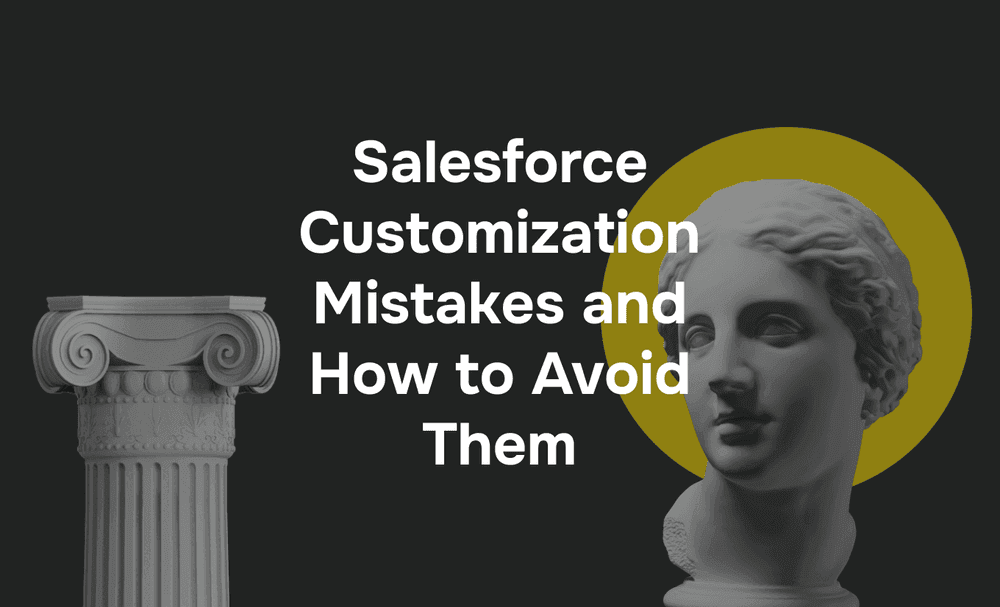When you're considering Salesforce Revenue Cloud for your business, it's essential to look beyond just its powerful features. Understanding the total cost of ownership (TCO) is key to making a smart investment.
In fact, McKinsey reports that industrial companies have achieved reductions in indirect costs by as much as 15–20% within 12 to 18 months through automation and AI. But here's the catch: your costs can vary significantly depending on factors like the number of users, the level of customization, and how well it integrates with your existing systems.
Revenue Cloud empowers businesses through revenue forecasting, automated quote-to-cash processes, and real-time insights that drive growth and profitability. But how do you ensure these benefits align with your budget? In this guide, we'll walk you through the key factors that impact the Cloud's pricing, explore the challenges your business may face during implementation, and show you how to optimize costs to maximize your ROI.
Core Features of Salesforce Revenue Cloud
Salesforce Revenue Cloud is designed to streamline the entire revenue lifecycle management from quote generation to cash collection and revenue recognition, providing businesses with a powerful, integrated platform for managing every aspect of their sales process.
Revenue Forecasting & Management
Salesforce Revenue Cloud provides real-time insights into your revenue pipeline, allowing you to forecast with greater accuracy. Leveraging AI helps sales teams predict revenue trends and adjust their strategies accordingly. The platform gives you a comprehensive view of revenue forecasts, enhancing customer engagement and empowering businesses to make informed decisions based on historical data and current opportunities.
Automated Quote-to-Cash Process
One of the standout features of the Cloud is its ability to automate the entire quote-to-cash process. From generating quotes to managing contracts, orders, and billing, the platform ensures a seamless transition between stages. With guided selling tools, your sales team can quickly create accurate quotes and contracts, ensuring that the final net price reflects the agreed terms, discounts, and product configurations. This automation ensures compliance and accuracy at every step, reducing errors and speeding up the sales cycle.
Real-time Insights & Analytics
Revenue Cloud solutions integrate powerful AI CRM for sales capabilities, providing real-time insights into your business's revenue operations. These AI-driven tools help businesses create precise formulas, optimize pricing strategies, and reduce operational costs while driving revenue growth. The platform’s advanced reporting capabilities enable managers to track performance, assess forecasts, and refine strategies - all from one centralized system.
Integration with CPQ, Billing, and Finance Systems
Seamless integration with Salesforce’s Configure, Price, Quote (CPQ) tools, billing, and finance systems is a game-changer for businesses looking to manage complex revenue models. Revenue Cloud ensures that sales, finance, and legal teams are all aligned by centralizing contract lifecycle management (CLM), order fulfillment, and billing processes. This integration allows businesses to manage multi-channel and usage-based billing, automate invoice scheduling, and optimize payment collection across the entire revenue cycle. peak pe
Challenges and Considerations
Implementing Revenue Cloud offers businesses a wide range of benefits, but it’s not without its challenges. Understanding these challenges and planning for them is critical to ensuring a smooth implementation process and maximizing the ROI of your Salesforce investment. Let’s explore some of the key hurdles businesses may face in contract creation and how the Cloud helps solve them.
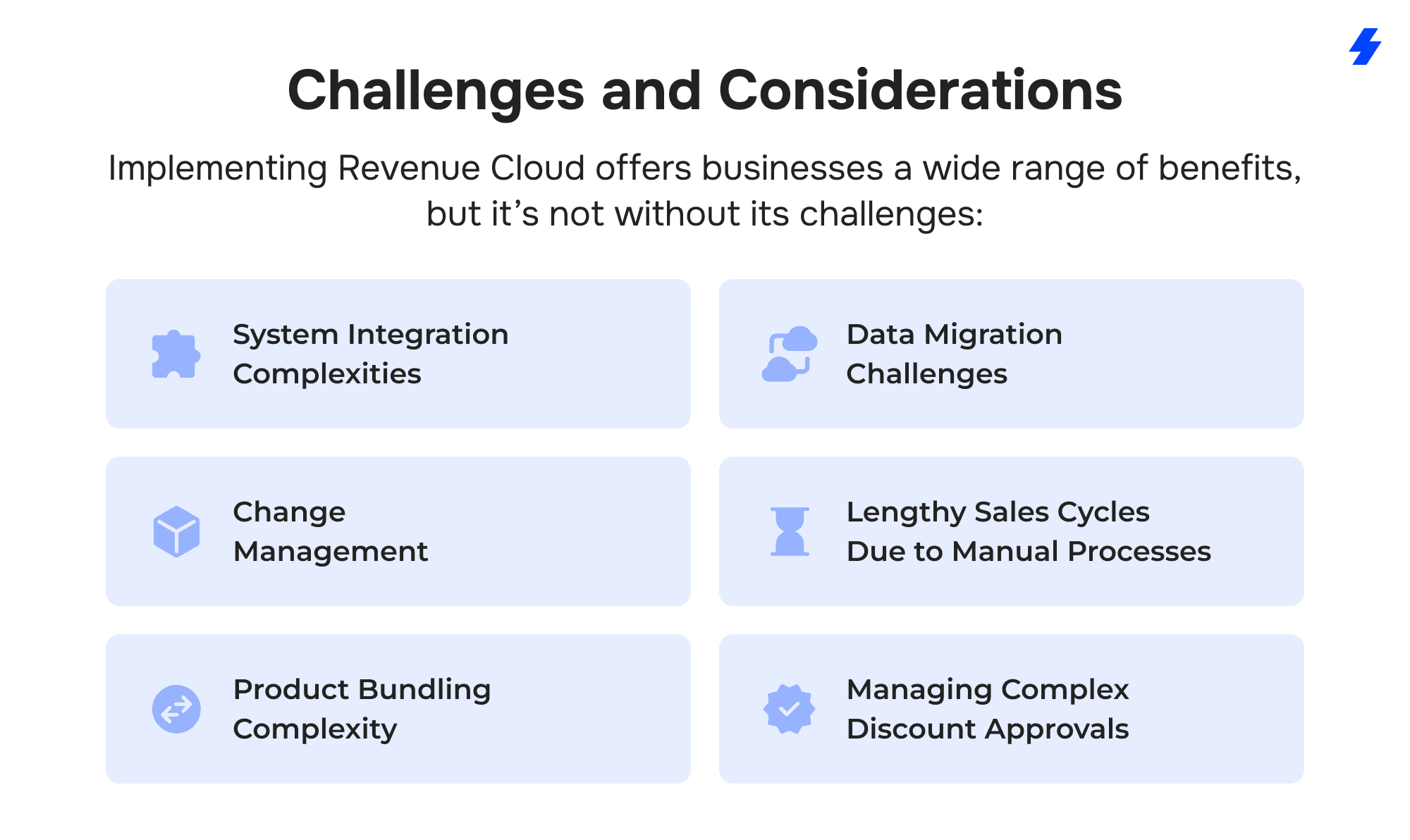
1. System Integration Complexities
One of the most common challenges businesses face is integrating Revenue Cloud with existing systems like ERP, billing, or CRM platforms. Without proper integration, you risk data silos and inefficiencies that can slow down operations. Salesforce also provides robust integration tools, such as MuleSoft, to simplify this process and ensure seamless data synchronization.
Revenue Cloud offers seamless integration with Salesforce’s CPQ, Billing, and Finance Systems, providing a unified platform that eliminates the need to manage disparate systems. This helps reduce errors, save time, and increase visibility across departments, especially when implementing custom fulfillment plans. The platform also supports real-time data exchange, ensuring that all teams - from sales to finance - are on the same page.
2. Data Migration Challenges
Migrating your legacy data to a new platform can be a daunting task. Data inconsistencies, incomplete records, or incompatible formats can lead to delays or errors in the transition.
Salesforce provides robust tools to streamline data migration and ensure a smooth transition. With its automated workflows and AI-powered tools, the system helps identify and correct inconsistencies in data before migration. Moreover, the platform’s integration capabilities allow for better data synchronization, ensuring a smooth migration and minimal disruption to business operations.
3. Change Management
Implementing a new platform often requires significant changes in how teams operate. Resistance to change, lack of proper training, or confusion over new workflows can hinder the effectiveness of the system.
Salesforce Revenue Cloud comes equipped with extensive training resources and support tools. Guided workflows, automated processes, and pre-built templates simplify the transition and ensure that your sales, finance, and legal teams can get up to speed quickly. Additionally, the unified platform fosters collaboration across departments, making it easier to align everyone with the new system and processes.
4. Lengthy Sales Cycles Due to Manual Processes
Sales teams often struggle with slow sales cycles because of manual data entry, disjointed processes, and a lack of automation. These inefficiencies lead to missed opportunities and frustration.
By automating key tasks such as quote generation, contract approvals, and billing, Revenue Cloud reduces the time spent on manual processes. Sales reps can focus more on engaging with customers and closing deals, while the system takes care of administrative tasks. This leads to shorter sales cycles and increased productivity.
5. Product Bundling Complexity
For many businesses, offering customized product bundles can be a challenge. Without a streamlined pricing calculation process, sales reps may struggle to create accurate quotes, leading to pricing errors and delays in closing deals.
With Salesforce CPQ (Configure, Price, Quote), Revenue Cloud simplifies product bundling by guiding sales reps through the process and ensuring they create accurate, customized bundles. Automated pricing and discount rules eliminate the risk of human error, while AI-powered tools suggest relevant upgrades or add-ons, helping sales teams deliver more value to customers.
6. Managing Complex Discount Approvals
Manual discounting systems often lead to delays, errors, and inconsistent pricing decisions. This can result in lost revenue and frustrated customers.
Revenue Cloud automates discount approval workflows, ensuring that all discounting decisions are based on pre-defined rules and criteria. Sales reps gain real-time visibility into approval statuses, ensuring consistency and minimizing revenue leakage.
What Affects the Cost of Revenue Cloud?
The cost of implementing the dynamic revenue orchestrator Cloud varies depending on several key factors that can influence both the upfront and ongoing expenses for your business. Here's a breakdown of the primary cost drivers:
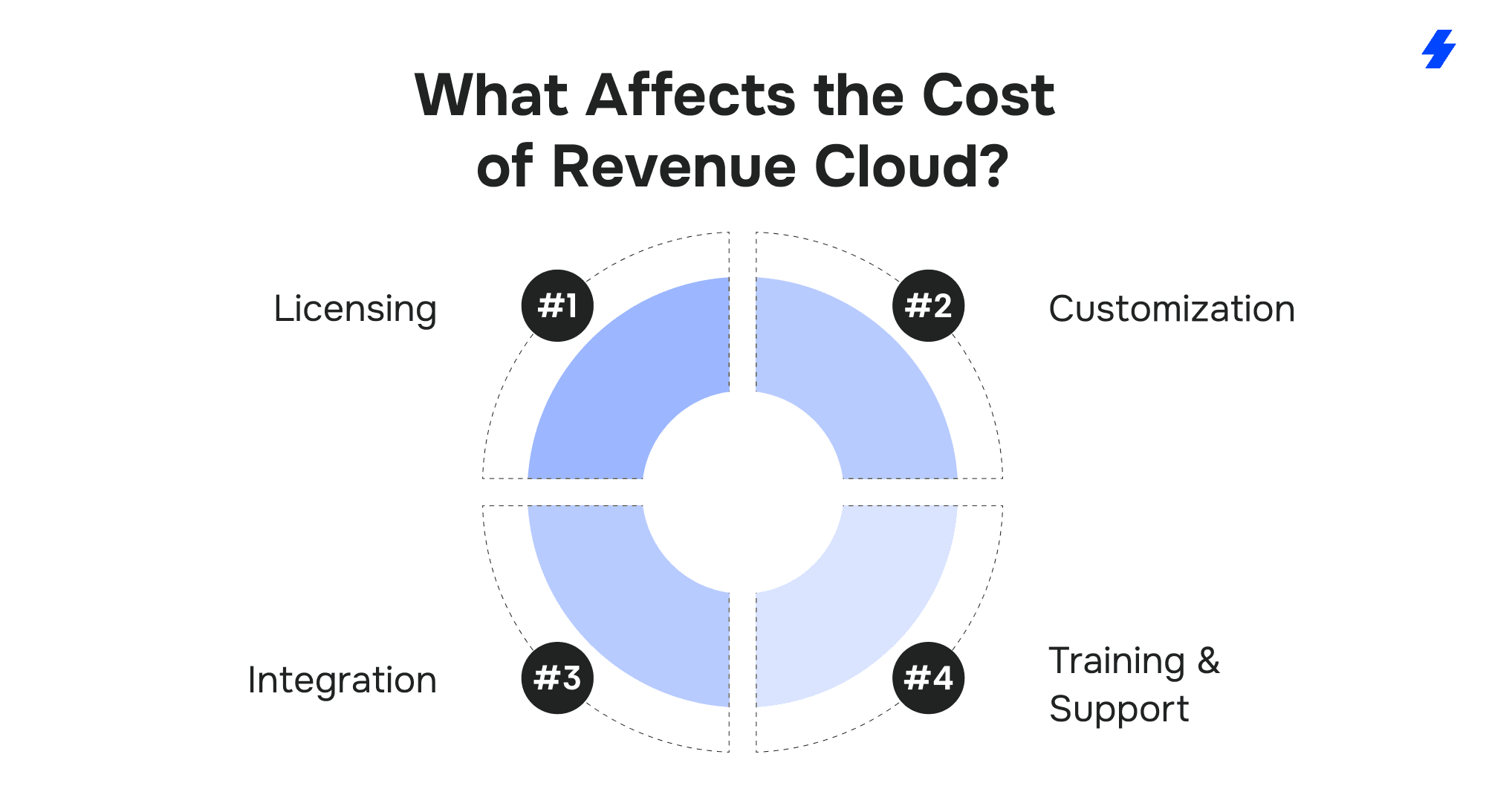
1. Licensing
Licensing fees for Revenue Cloud are typically based on the number of users or active processes. Businesses with larger teams or more complex revenue models may incur higher costs. Salesforce offers flexible pricing tiers, allowing companies to select the most appropriate package based on their scale and requirements.
2. Customization
Customizing Revenue Cloud to fit your business’s unique needs can incur additional costs such as integrating with legacy systems or creating custom workflows. Whether it's adjusting workflows, configuring specific features, or developing custom solutions, the complexity of the customization required will impact the total price. More extensive modifications may require professional services or third-party development.
3. Integration
Integrating Salesforce Revenue Cloud with your existing systems (such as ERP, billing, or finance platforms) comes with its own set of costs. Depending on the level of integration needed, including product catalog management, and the complexity of your current systems, these expenses can vary. Integration tools and services may also involve ongoing maintenance fees.x
4. Training and Support
To ensure your team fully leverages the platform, training costs should be considered. Salesforce offers training resources, but for more in-depth or personalized sessions, you may need to invest in external training programs. Post-implementation support is another ongoing cost that helps maintain system efficiency and address any technical issues that arise.
How Does Revenue Cloud Compare in Terms of Cost?
When evaluating Revenue Cloud against other revenue management platforms like SAP, Oracle, and Zuora, it's important to look beyond just the initial costs. What truly sets Salesforce apart is its scalability, flexibility, and the potential ROI it offers, especially for businesses focused on growth and efficiency.
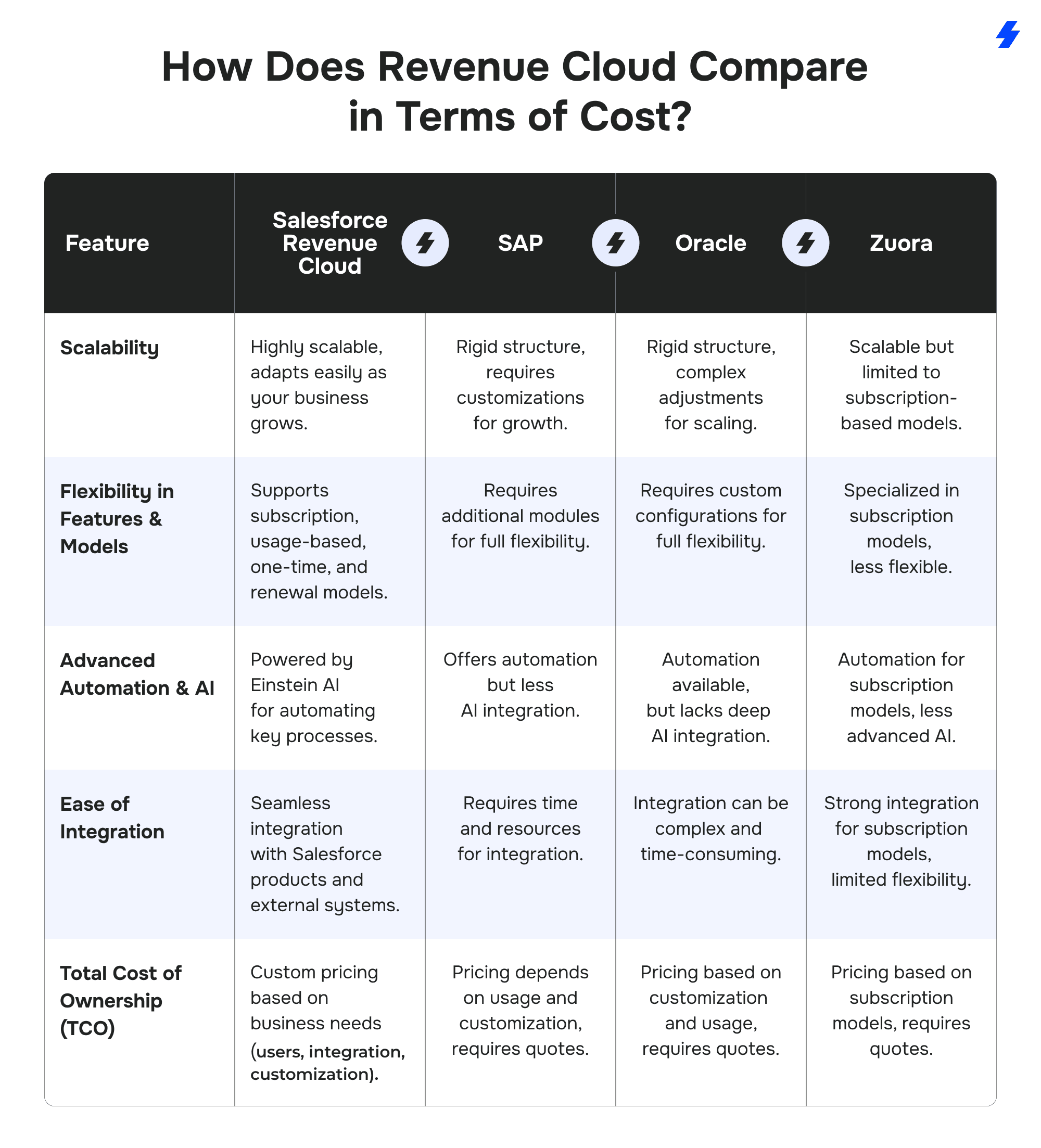
1. Scalability
Salesforce Revenue Cloud is designed with scalability in mind. As your business grows, your revenue management needs will evolve. Unlike SAP and Oracle, which often require complex customizations, Revenue Cloud easily adapts to your business’s evolving needs. Whether you are handling a small number of users or managing a complex, multi-channel sales operation, Salesforce can scale effortlessly to meet your needs.
By contrast, platforms like SAP and Oracle tend to have more rigid structures, making it harder to adapt quickly to market changes without incurring additional costs or delays. Revenue Cloud’s cloud-based architecture ensures that businesses can add users, integrate new systems, and manage various revenue models without significant disruptions.
2. Flexibility in Features and Monetization Models
The Cloud offers unmatched flexibility in terms of supported revenue models. It can handle subscription-based models, usage-based billing, one-time purchases, and renewals, among others. This makes it ideal for businesses with diverse revenue streams or those anticipating a shift in their business model.
In comparison, platforms like Zuora specialize in subscription-based pricing and billing, which might limit your options if your business operates under a different model. SAP and Oracle offer robust solutions but often require custom configurations and additional modules for full flexibility, which can increase the overall cost of ownership.
3. Advanced Automation and AI Capabilities
Revenue Cloud is powered by AI tools like Einstein, which help automate key processes such as quote generation, pricing, and contract lifecycle management. This not only speeds up the sales cycle but also ensures accuracy and consistency across your operations.
While SAP, Oracle, and Zuora offer automation features, Salesforce's AI-driven approach integrates more deeply across the sales and revenue management processes, offering real-time insights and smarter decision-making capabilities. This results in improved sales productivity and faster revenue realization, delivering a higher ROI over time.
4. Ease of Integration
Another standout feature of Salesforce Revenue Cloud is its seamless integration with other Salesforce products, such as Sales Cloud and Service Cloud, as well as external systems like ERP and billing software. This ease of integration helps reduce operational complexity and ensures a unified platform that works for all teams.
On the other hand, platforms like SAP and Oracle may require more time, resources, and cost to integrate effectively with existing systems. Zuora also offers strong integration capabilities but is more tailored to subscription-based businesses, which might limit flexibility for other models.
5. Total Cost of Ownership (TCO)
While specific cost details for Revenue Cloud and transaction management aren’t typically disclosed publicly, the pricing structure generally depends on factors such as the number of users, customization, and integration complexity. Salesforce typically offers tailored quotes based on your business’s needs, which can vary depending on these factors. Similarly, SAP, Oracle, and Zuora have pricing models that vary depending on usage, customization, and integration, but they too often require businesses to request quotes for a more accurate price estimate.
Why Consider Implementing Revenue Cloud with MagicFuse
When it comes to implementing Salesforce Revenue Cloud, partnering with an experienced Salesforce development company like MagicFuse offers several significant advantages that can streamline your revenue operations, improve data accuracy, and maximize overall efficiency.
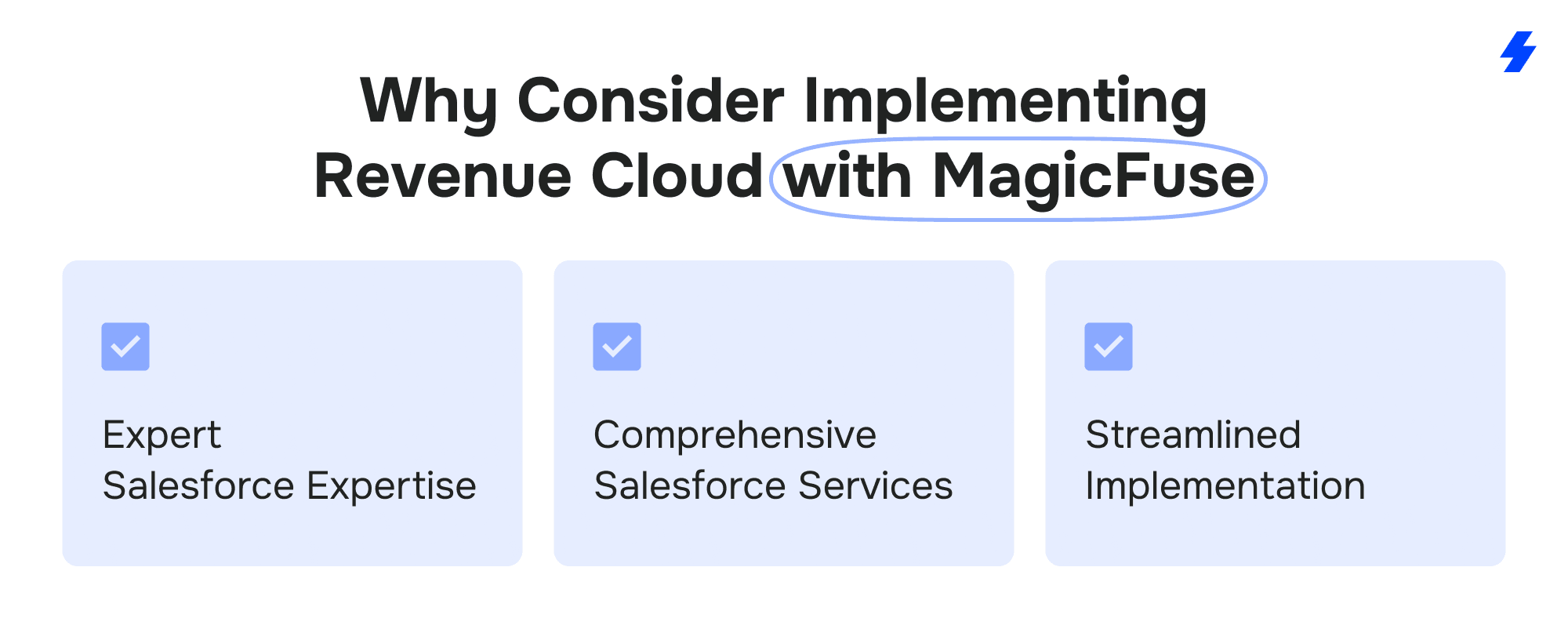
Expert Salesforce Expertise
With over 10 years of experience and a team of 70+ certified Salesforce experts, MagicFuse specializes in integrating and customizing Salesforce solutions to meet your unique business needs. We ensure Revenue Cloud seamlessly fits into your existing systems.
Comprehensive Salesforce Services
We provide end-to-end services, from implementation to ongoing managed services and custom integrations. Our holistic approach ensures all Salesforce components - Sales Cloud, CPQ, Billing - work cohesively to streamline your operations and drive growth.
Streamlined Implementation
MagicFuse guarantees a smooth deployment of Salesforce Revenue Cloud, minimizing disruptions and ensuring rapid ROI. We handle every aspect of setup, integration, and customization to help your team quickly realize the benefits.
Conclusion
Revenue Cloud offers scalable, efficient solutions to streamline revenue operations, automate key processes, and provide real-time insights. While costs vary based on licensing, customization, and integration, the platform delivers significant value in terms of sustainable growth and efficiency.
Partnering with experts like MagicFuse ensures optimal implementation, helping you maximize ROI and unlock the full potential of Revenue Cloud. Contact MagicFuse today to streamline your revenue operations and drive long-term success.
FAQs
What is the average cost of implementing Revenue Cloud?
The cost of implementing Revenue Cloud depends on several factors, including the number of users, customization, integration requirements, and ongoing support. Since Salesforce offers tailored pricing and advanced approvals, it's best to request a personalized quote for your specific business needs.
Can Revenue Cloud be scaled to fit small businesses?
Yes, Revenue Cloud is highly scalable and can be tailored to fit small businesses. It offers flexible pricing and features that grow with your business, making it suitable for both small and large operations.
How can MagicFuse assist in implementing Revenue Cloud?
MagicFuse specializes in Salesforce integration and customization. We offer end-to-end services, from implementation and customization to post-deployment support, ensuring a smooth setup and helping your business optimize Revenue Cloud for maximum efficiency and ROI.
What are the ongoing costs of Revenue Cloud?
Ongoing costs typically include subscription fees, maintenance, customization updates, and support services. These costs depend on the level of service and the specific needs of your business. MagicFuse can help you manage these costs by optimizing your Salesforce implementation and ensuring ongoing efficiency.










